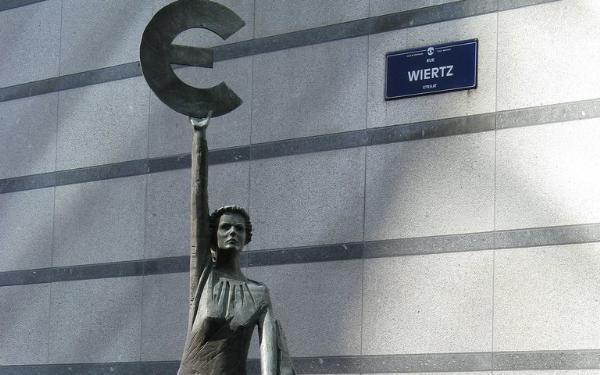What has been the reaction outside of the United Kingdom to David Cameron’s decision to withhold the UK’s participation in the Eurozone rescue plan? Frank Turner SJ of the Jesuit European Social Centre, explains how things stand now for Britain and for the other 26 EU member states, and suggests some criteria according to which this decision and its effects ought to be assessed.
Shortly after the tense Summit of the European Council, an email from my brother, living in the UK, quoted a lengthy joke mocking the supposed expensive uselessness of the European Parliament. That same day, at a Christmas choral concert in Brussels, the composer, William Byrd was introduced (in Dutch, French and English) as offering ‘a perfect synthesis of the English and continental styles – probably not David Cameron’s favourite composer’. As the EU is mocked in the UK, so is the UK elsewhere in the EU.
Leaders are rarely at their most generous and empathetic when faced with a crisis, aware how fragile is their public mandate and how urgent political decisions may look rash with hindsight. In 2011 alone, the economic crisis has helped bring down governments in Greece, Ireland, Italy, Portugal, Slovakia and Spain. Feelings run high in the capital cities of Europe on Mr Cameron’s decision to reject participation in the rescue package presented at the European Summit in early December. I hope a relatively calm reflection is possible, picking its way amongst a few of the innumerable commentaries.
Two histories
In January 2012, the Euro is precisely ten years old, though any birthday parties have been kept quiet. The fudges made at its birth are well-known. In the case of a national currency, a balance-of-payments deficit, a sharp increase in public debt, or a significant decrease in exports, causes the currency to fall: a sustained deficit may even require devaluation to seek restored competitiveness, while painfully reducing purchasing power. However, the Euro is shared by very disparate economies, some flourishing, some struggling; some strong exporters, others – such as Greece – with virtually no export except tourism. These countries have divergent taxation cultures, employment laws, pension provisions, regulatory frameworks. Yet the problems of one country inevitably spill over to another.
Therefore the stability of the ‘Eurozone’ requires strong institutions to coordinate and supervise the members’ policies. Establishing such a regulatory regime takes time, the willingness to negotiate, and above all openness of leaders to consider amending national institutions and practices. As the Euro was established, the requisite steps were not taken, though the need was clearly recognised. Convergence criteria were established regarding inflation, national budget deficits (not to exceed 3% of GDP) and public debt (limited to 60% of GDP). This regulation proved unenforceable, however, and the fines were not imposed when the budget deficits of Germany and France exceeded the 3% limit for three years (2000 to 2002). It was untenable, or ‘hypocritical’, to punish smaller countries that later transgressed, by far larger margins.[1] Greece’s difficulties were known early on to the EU, which failed to intervene in time.
The Euro has helped reduce inflation in the Eurozone to some 2%, and the absence of Eurozone exchange rates alone saves between €20 billion and €25 billion every year. More importantly, as Jacques Delors has recently insisted, it ‘made it easier for people to travel around and for capital to be transferred, strengthening the advantages of the European Union in its relations and negotiations with the rest of the world’. However, it both signifies and relies on a certain mutual support between the Eurozone members and probably beyond. The current drama derives from an international financial crisis that far transcends Europe, combined with a deficient structure of cooperation among the governments of the EU.
In the face of its own pressing economic difficulties, the British Government’s relief at not being part of this particular mess, and its determination as a non-Eurozone country to keep its distance, is understandable. Faced with a set of measures he could not defend in the Westminster parliament, Mr Cameron rejected the proposal to amend the Lisbon Treaty itself. ‘What is on offer isn't in Britain's interests so I didn't agree to it.’ ‘Britain’s interests’, turned out to be more or less reducible to the interests of the City of London, a point to which I will return.
There is a second history. For other EU member states, this is only the latest in a series of UK rejections of collective EU decisions. At Maastricht (1992) the UK rejected not only future membership of the Eurozone, but also the ‘social chapter’ on employment practices. Nor is it a member of the Schengen Area that ends border controls between states, and which includes some non-EU countries – Iceland, Norway and Switzerland. The UK rejected that part of the Treaty of Lisbon (2009) that requires the incorporation of the Charter of Fundamental Rights in the EU into British Law, once again because of the Charter’s provisions on labour law. In 2009, Mr Cameron even ordered the withdrawal of the UK Conservative Party from the European People’s Party, the centre-right group in the European Parliament and currently the largest parliamentary grouping, because the group often favours further integration of European political and social policies.
The UK’s favoured model influences its approach to matters relatively unrelated to the present crisis. Its strong support of the entry of Turkey into the EU, for example, seems to have little to do with Turkey as such: what seems decisive is that Turkey’s membership would both expand the single market and make deeper political integration less plausible.
In short, the UK wants an efficient single market and practically nothing else. It has consistently opted out of measures that seem to undermine sovereignty, and measures that serve as a corrective to the market at the European level. However, while promoting this minimal model of the EU, the UK also aspires to a central role in EU decision-making.[2]
A precarious rescue project
I turn to the December ‘Summit’ that provoked the latest split. The Eurozone rescue deal faces one major political, one economic and one regulatory challenge. Politically, can the necessary level of collaboration, that was initially absent, now be generated in the face of crisis? Economically, is there an acceptable way to reduce these paralysing debt and deficit figures, given that debt reduction requires ‘austerity’ but that debt repayment needs the generation of surplus income? Finally, how can confidence be instilled that (unlike in the past) regulations will mean what they say?
The UK rejected any amendments to the Treaty of Lisbon on principle, according to Mr Cameron, but also fearing difficulties in gaining assent both popularly and at Westminster. In consequence, the necessary regulations must be enacted not through a communitarian treaty but through separate ‘inter-governmental’ deals among the other 26 member states, the UK being a mere observer. For the EU this is a serious problem, since it is the ‘community method’ – involving the European Commission and European Parliament, representing respectively the EU as a single entity and its citizens – that in principle assures the rights of smaller and weaker states. In a free-for-all of 26 states which are economic competitors no less than partners, every substantive proposal will be fiercely opposed, since so much is at stake. No ‘constitution’ exists to arbitrate the disputes. But as 2011 showed, inter-governmentalism entails the pre-eminence of the powerful partnership of France and Germany, symbolised in the coinage ‘Merkozy’ – the odd-couple alliance that seems to drive every new initiative.[3]
The UK – often a significant counter-weight to France and Germany – has excluded itself from having a voice in this inter-governmental process, the process it has always favoured over against the community method. At the Summit, Mr Cameron even insisted that the European Commission, being an instrument strictly of the 27, be forbidden to service these negotiations, though he later backed down or (more kindly interpreted) agreed to keep an ‘open mind’. Nevertheless, every such discussion of the 26 will highlight the UK’s isolation and its refusal to be part of the solution accepted by the majority. The 26 are divided in many ways, so that the success of the process is far from assured: but the ‘1’ is also divided, for Mr Cameron’s view was rejected by his coalition partner, Nick Clegg, who declared publicly his bitter disappointment at the veto. Though Mr Cameron cannot possibly wish the process to fail, since the UK would suffer from the Euro’s demise, his opt-out makes failure more likely than it would have been otherwise.
Three types of conclusion
An assessment of the British decision should take into account at least three elements. First, to state the obvious, the world crisis goes far beyond the EU, which cannot reasonably be blamed for the crisis. In some sense it was triggered by the ‘sub-prime mortgage crisis’ in the USA and instances of massive corporate collapse, such as Freddie Mac and Fanny Mae, the insurance giant AIG and Lehman Brothers – as well as the complicity of the ratings agencies which now appear fearsome as they downgrade the creditworthiness of whole states.[4] Meanwhile, average USA household income has fallen by 10 percent over the past decade and the USA is now the most unequal country in the industrialised world. The ratio of US foreign debt to GDP is higher than in any EU country except Greece and Italy. Within Europe itself, the catalyst for the crisis emerged from outside the EU, in the Icelandic banking bubble and the utter failure of the Icelandic government to regulate it.
This crisis already transcends economics. As the political theorist Charles Kupchan has commented, there is ‘a widening gap between what electorates are asking of their governments and what those governments can deliver.’ In fact, the economic challenges facing governance are essentially transnational. ‘The plight of the West’s middle class is the consequence primarily of the integration into global markets of billions of low-wage workers from the developing world’.
One might expect this global shock to lead EU countries to cling together, to use the EU institutions to devise common strategies. Instead it is driving them apart. The UK is misled if it expects to respond to the crisis on its own, or if it thinks its favoured EU achievements (a single market within the EU and a single policy on the EU’s external trade) can resist the centrifugal force it is encouraging.
The second aspect is Mr Cameron’s privileging of the world of finance. At the Summit, he unsuccessfully insisted on special clauses in the final resolution to protect not merely Britain’s sovereignty but specifically the UK’s financial sector, i.e., the City of London: any transfer of power from a national regulator to an EU regulator on financial services should be subject to a veto; the European Banking Authority should not be moved from London; and the European Central Bank should not be allowed to rule that Euro-denominated transactions take place within the Eurozone.[5] Naturally the UK is neither the only country of the EU with strong national interests, nor the only country to defend them. Yet as the German Social Democrat MEP, Jo Leinen remarked, ‘In common market questions it is not possible for France to ask for an opt-out on agricultural policy, for Germany to ask for an opt-out for automobiles, or for Spain to ask for an opt-out on fisheries policy. So Britain cannot ask for an opt-out on financial regulation’.
Mr Cameron’s anxiety reflects the sheer weight of the City’s presence in British life. It came top in the ‘Worldwide Centres of Commerce’ in 2008 (even above New York) and it processes some 34% of the world’s foreign exchange transactions. Turning that argument around, however, the more important the industry, the more important is its regulation. It has so far proved impossible to find a stable basis for taxing the vast profits made on transnational capital transfers, and the City is generally adept at finding new and creative ways to minimise taxation. The finance sector was at the heart of the financial crisis of 2008; certain companies still seek maximal profits by exploiting the vulnerability of states, so that their better regulation is a matter of social justice and the common good.[6] If public debate is dominated by the failings of government this is partly because no one expects either morality or responsibility from such institutions as hedge funds. That needs to change.
Third: though this discussion has focused on economics, the consequences of an economic collapse reach beyond economics. In some countries of the EU there have already been fierce social protests, which will surely intensify. In Spain, where unemployment among the under-25s stands at over 40%, a further deterioration could entail threats to social and political order, for mass unemployment is an extraordinary social evil. As José Ignacio Torreblanca wrote in El Pais on 2 January, the crisis ‘has brought into question the democratic self-respect of our societies, subject to market forces over which they detect a lack of control’. He adds ominously, ‘societies that are afraid and that feel insecure tend to turn in on themselves, become wary of their surroundings, open the door to populism and sacrifice freedom for the sake of greater security’.
Christian social teaching – in its Catholic version but also elsewhere – always insists that economics can never be a self-sufficient discipline. Two citations among many will suffice:
The State has the task of determining the juridical framework within which economic affairs are to be conducted, and thus of safeguarding the prerequisites of a free economy, which presumes a certain equality between the parties, such that one party would not be so powerful as to reduce the other to subservience (Pope John Paul II’s Centesimus Annus, §.15).
Almost twenty years later, here is the Archbishop of Canterbury, Rowan Williams:
Economics understood in abstraction . . . is not just an academic error: it actually dismantles the walls of the home. Appealing to the market as an independent authority . . . has meant in many contexts over the last few decades a ruinous legacy for heavily indebted countries, large-scale and costly social disruption even in developed economies; and, most recently, the extraordinary phenomena of a financial trading world in which the marketing of toxic debt became the driver of money-making – until the bluffs were all called at the same time.[7]
It is unlikely that there is an early or a painless ‘solution’ to this crisis – but I also suspect that Mr Cameron’s combination of nationalism and minimally regulated free-market capitalism, especially the capitalism of the finance sector, is the worst possible non-solution.
Frank Turner SJ is Secretary for European Affairs at the Jesuit European Social Centre in Brussels.
Sources used and cited
Nicholas Boyle, ‘How to save the euro’, The Tablet, 19 November, 2011
Jacques Delors, ‘The Single Currency, a tool providing spiritual momentum for European unification’, Europe Infos 145, January 2012.
Sylvie Goulard MEP, ‘What I want in 2012: Europeans and Europe to get the respect they deserve’, Europe Infos 145, January 2012.
Charles A. Kupchan, ‘Refounding Good Governance’ (International Herald Tribune, 19 December 2011)
John Lanchester, Whoops!: Why Everyone Owes Everyone and No One Can Pay (Penguin, 2010).
William Mathews, ‘Finance Ethics’, The Lonergan Review, Seton Hall University Vol II, No 1, Spring 2010, 150-174.
William Mathews, ‘Euro Lessons in Context’, Thinking Faith, 11 November 2011.
[1] As at 2011, for example, Greece’s budget deficit is 9% and its ratio of debt to GDP a massive 142%. At the same date, according to the EU’s statistical office, the average ratio of Eurozone countries was 85%, that of the UK 80%.
[2] What also astonishes and alienates European observers is the distorting, even disabling, power of the popular media. It would be a challenge to find, in The Sun, the Daily Mail or the Daily Express a single editorial favouring the EU or even discussing it with courtesy. This deliberate poisoning of public opinion amounts to an offence against democratic legitimacy and the public good.
[3] They have sometimes strongly disagreed, of course: for example about the mandate of the European Central Bank. May it buy government bonds, or only support banks themselves?
[4]Standard and Poor’s gave 64,000 related products [an] AAA credit rating’ (Mathews, 2010).
[5] The Guardian, December 9th, 2011
[6] ‘Vulture funds’ for example, operate by buying up the debt of poor nations cheaply when it is about to be written off and then suing the country itself for the full value of the debt plus interest. For example the vulture fund operated by ‘FG Hemisphere’ is currently pursuing a legal action in Jersey for $100 million against the Democratic Republic of Congo, to reclaim a debt from the Zaire to Yugoslavia for which it, FG Hemisphere, allegedly paid $3.3m. See http://www.bbc.co.uk/news/mobile/business-15745003 and http://www.trust-world.net/component/content/article/437-fg-hemisphere-associates-llc-v-democratic-republic-of-congo-2010-jrc-195
[7] ‘Human Well-Being and Economic Decision-Making’, an address to the Trades Union Congress, London, 16 November 2009.
More on the eurozone crisis on Thinking Faith:
![]() ‘Euro Lessons in Context‘ by William Mathews SJ
‘Euro Lessons in Context‘ by William Mathews SJ
![]() ‘The United Kingdom?‘ by Tony Carroll
‘The United Kingdom?‘ by Tony Carroll






